03 Sep 2020 (BA)
CultBooking Hotel Booking Engine – comparison and alternative to CloudBeds
In this article, we will compare and review Cloudbeds hospitality management suite against Cultbooking. Both are hotel booking software, but with different strengths. Cloudbeds has an over all-suite which includes features, like a property management system(PMS) Channel manager and a booking engine whilst Cultbooking prizes itself as a booking engine and a channel manager.
Now, step by step we will compare their services from a user point of view.
Cultbooking offers a free demo and lists their pricing on their website. Cloudbeds on the other hand only offer a demo if you request for one via their website. You are asked to leave contact information and then wait until you hear from them. If you click on the pricing tab on the website you will be taken through a short process where you are asked to confirm which country you operate from and the number of hotel rooms you currently manage.
Before we start comparing let’s get a quick overview of what exactly a hotel booking engine is and what advantages are sought by the market in general. The booking software is integrated directly into the website of a hotel and acts almost like a hotel employee that never sleeps nor rests. With a booking software installed, prospective guests browsing your website can check for live prices and availability at your hotel. With this never tiring, 24/7 employee you will receive commission-free bookings from around the world. The booking manager takes down all relevant information like credit card information which guests can use to secure their reservation and to secure your interests, in case of a cancellation.
A booking manager also takes a load of your e-mail and phone communications with your guests and centralises room reservations. That way your staff can focus their energy more on customer service and hospitality. The online reservation system is a great addition to other services like Booking.com and other Online travelling agencies(OTA) With such an integrated software service you will gain a birdseye view of your marketing strategies as your hotel can gain a larger market share of potential guests which can now check out your services and prices effortlessly.
As we continue comparing, it’s important for context to also learn a little bit about the two companies.
Cloudbeds
The idea that became Cloudbeds goes back to 2012 as founders Richard Castle and Adam Harris set out the blueprints of what we know today as Cloudbeds hospitality management suite. The company has grown considerably and have employees in over 40 countries. Cloudbeds have been through two financing rounds and is the suite used in 157 countries and growing.
Cultbooking
CultBooking is a division of the renowned Cultuzz Digital Media GmbH, a leading provider of software and technology solutions for the travel and tourism industry. Originally founded over 20 years ago, CultBooking went through a company remake and upgrade in 2018. Based in Berlin they also have teams in Portugal, Bulgaria, Ukraine, Pakistan and India.
The companies are quite different in scope and when compared in this context one finds himself thinking of David and Goliath. What sets them apart mainly is the number of tools and features, especially Property management system(PMS) which is not a feature in CultBooking, so let’s focus on a feature which evens out the field for CultBooking, the booking engine.
TABLE – comes here
1. Booking Calendar
1.1 Smart calendar
A smart calendar is a simple tool to help potential guests to find out about room availability. The calendar also makes it possible to incorporate the daily lowest price. The Hotel Zion uses CultBooking as its booking engine. It is quite clear on the calendar that the 21st of September is fully booked and is greyed out to highlight that there is no vacancy on that chosen date.
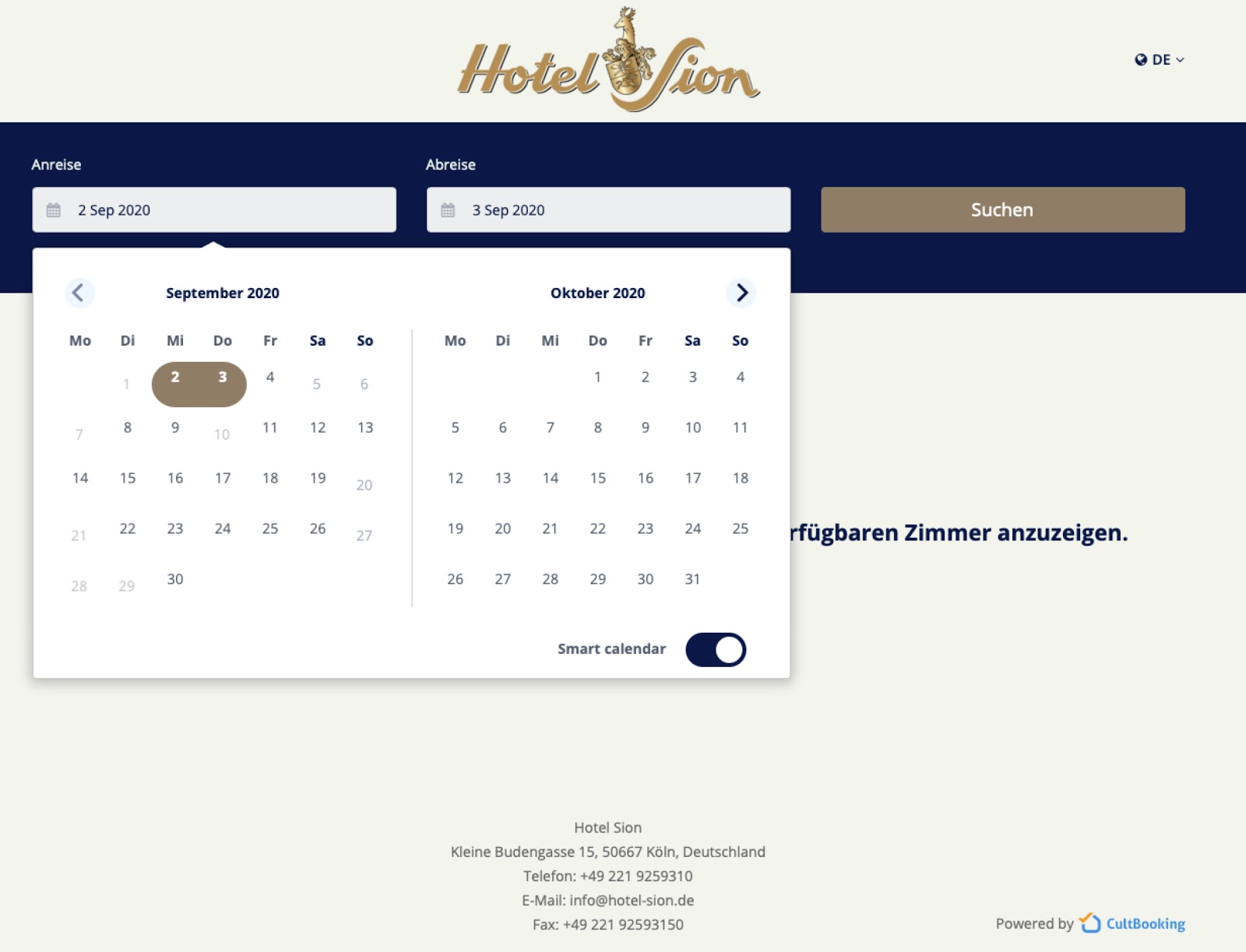
The user can even activate or deactivate the smart calendar if he wishes so. But it is up to the hotel have this feature as ‘ON’ as a default or leave it on standard.
If the hotel is heavily booked with many days greyed out or maybe have booking restrictions to a two night minimum then having the smart calendar always ‘ON’ is recommended by CultBooking.
–
Cloudbeds also has a smart calendar but it’s not available to potential guests as a default.
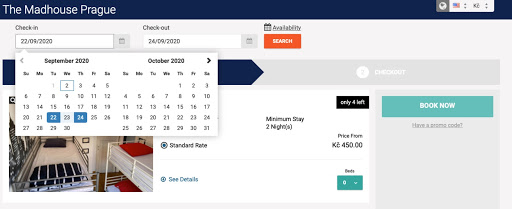
In order to get the smart calendar it is necessary to press “Availability” to enter the smart calendar:
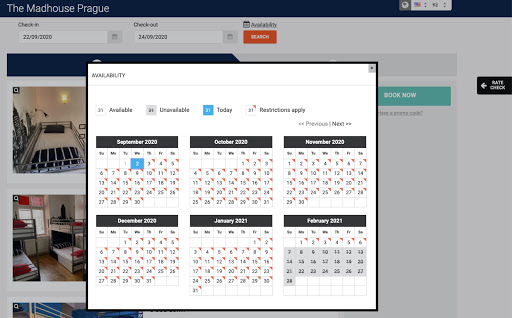
When it is there, the smart calendar feels sleek and similar to CultBooking but the difference comes noticeable when we tried it out. If for example a date that has restrictions a pop-up window opens up. Inside that window the types of restrictions which apply to the date are presented to potential guests. The pop-up is not very user friendly and might be confusing to some as the restriction asks the guest to book at least 2 nights and it’s not possible to search for dates. Therefore it is necessary to backtrack to the calendar as you can search directly when in the pop-up window. Neither the standard calendar nor the smart calendar are directly connected so the whole thing comes tricky, and at worst a bit frustrating.
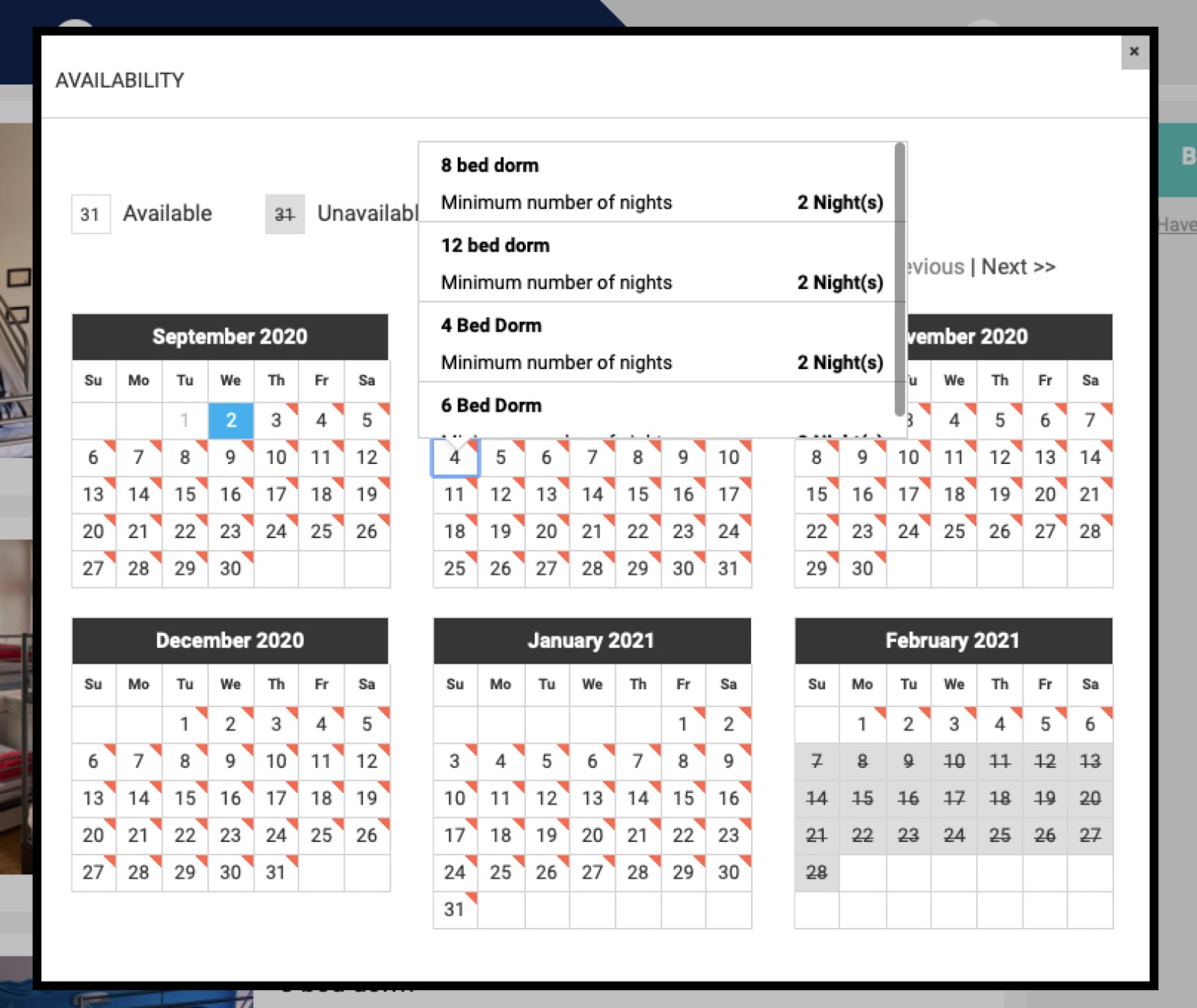
CultBooking does it in a smart way, when there is a minimum stay, going with the mouse over the restriction it displays the message and when clicking on the day, it automatically takes minimum 2 nights, that is why it is called a smart and automated service 🙂
When comparing the two calendars it is obvious that the approach CultBooking decided to go with is the winner. If there is a minimum stay it’s enough to hover over with the mouse pointer, for example on a restricted date, click it and automatically select 2 nights. No pop-ups or cul de sacs for the potential guest. Sleek, simple and automated.
2. Functions
2.1 Promo code
A promo tag is a way for hotels to create special promotions by providing vouchers for guests to increase loyalty and boost bookings. Promo tags also apply for special pricing for companies and as a way to reward customer loyalty.
CultBooking promo option is fully customizable and can be integrated into existing promotions in the room selection page.
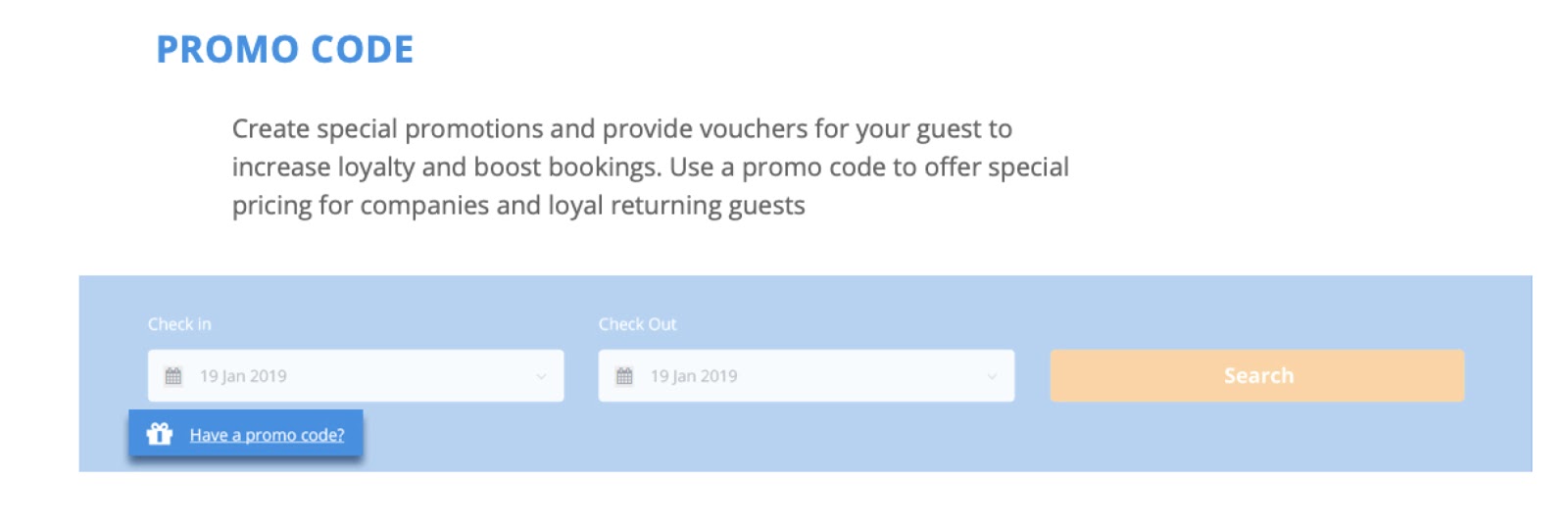
Cloudbeds also has promo tags integrated and customizable but they have to be manually inserted by guests.
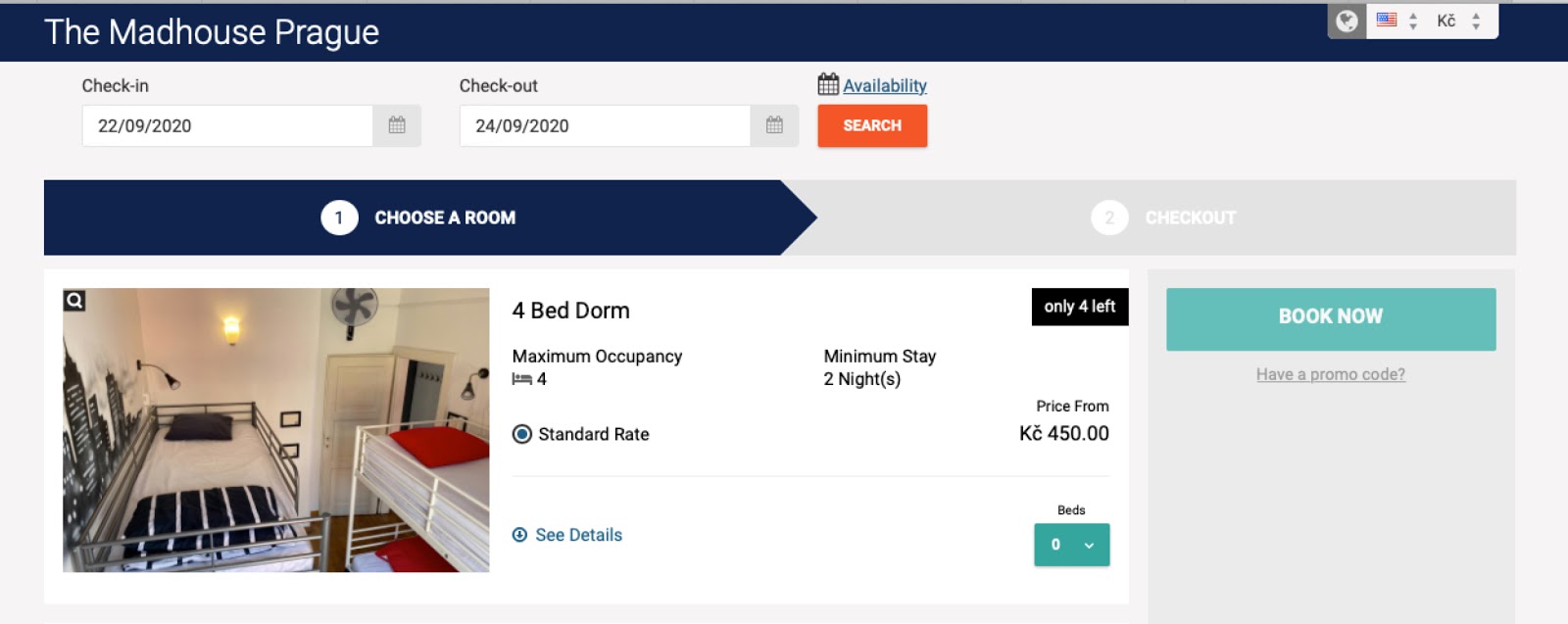
2.2 Occupancy prices
Both products give potential guests the option to select how many guests so room occupancy can determine the price.
CultBooking
You can select in the double room, a single usage and there is even a discount for 1 person. You need to use the drop-down for persons.
For example with CultBooking if the double room is selected for a single usage an automatic discount is applied for one person. Potential guests can use the drop-down menu to decide on the number of persons.
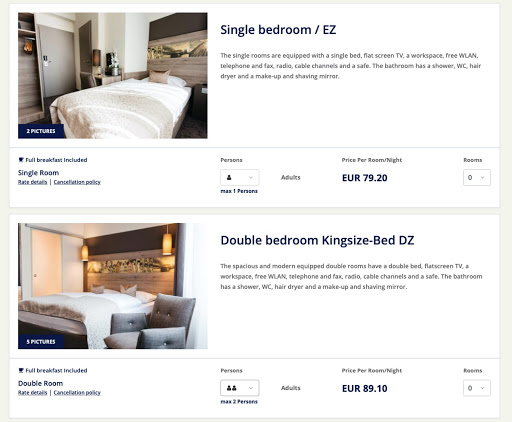
Here is another example of how this cloud-based function of CultBooking looks like:
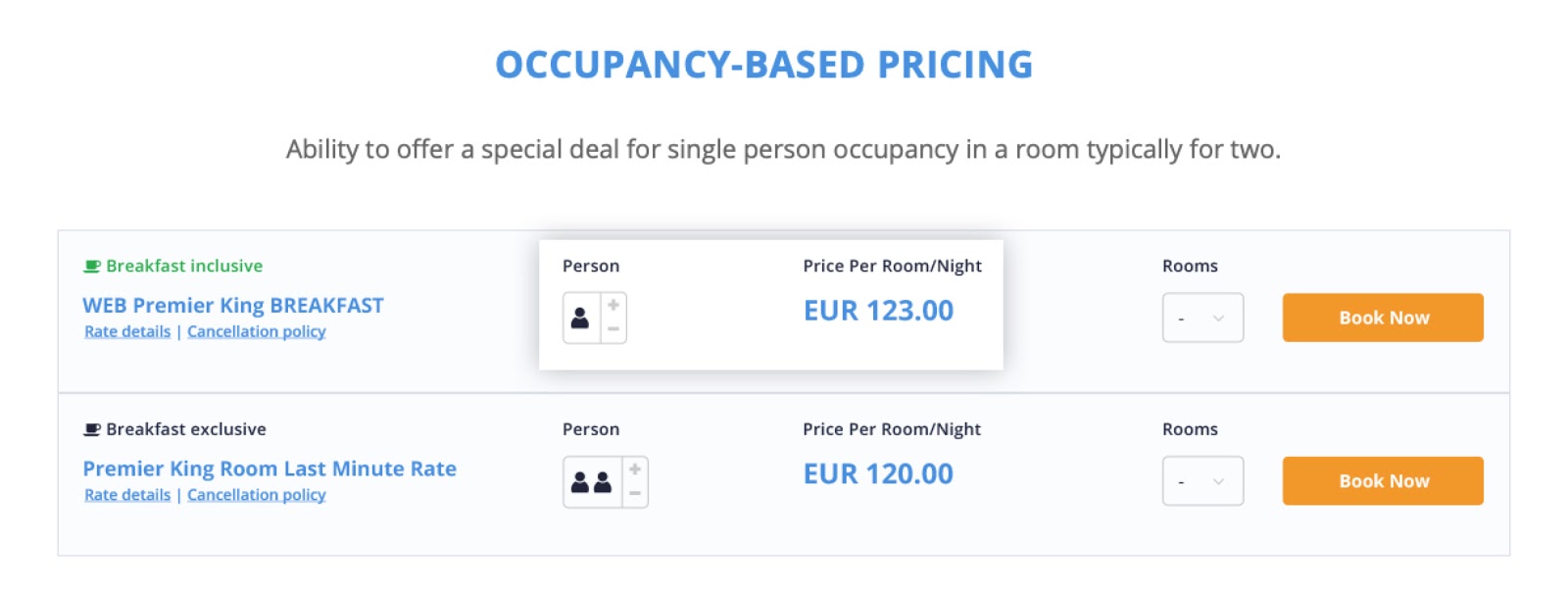
Here we have an example of a hostel that uses Cloudbeds, the Madhouse Prague. In this dorm, the engine can not indicate the number of guests that can be booked into the dorm.
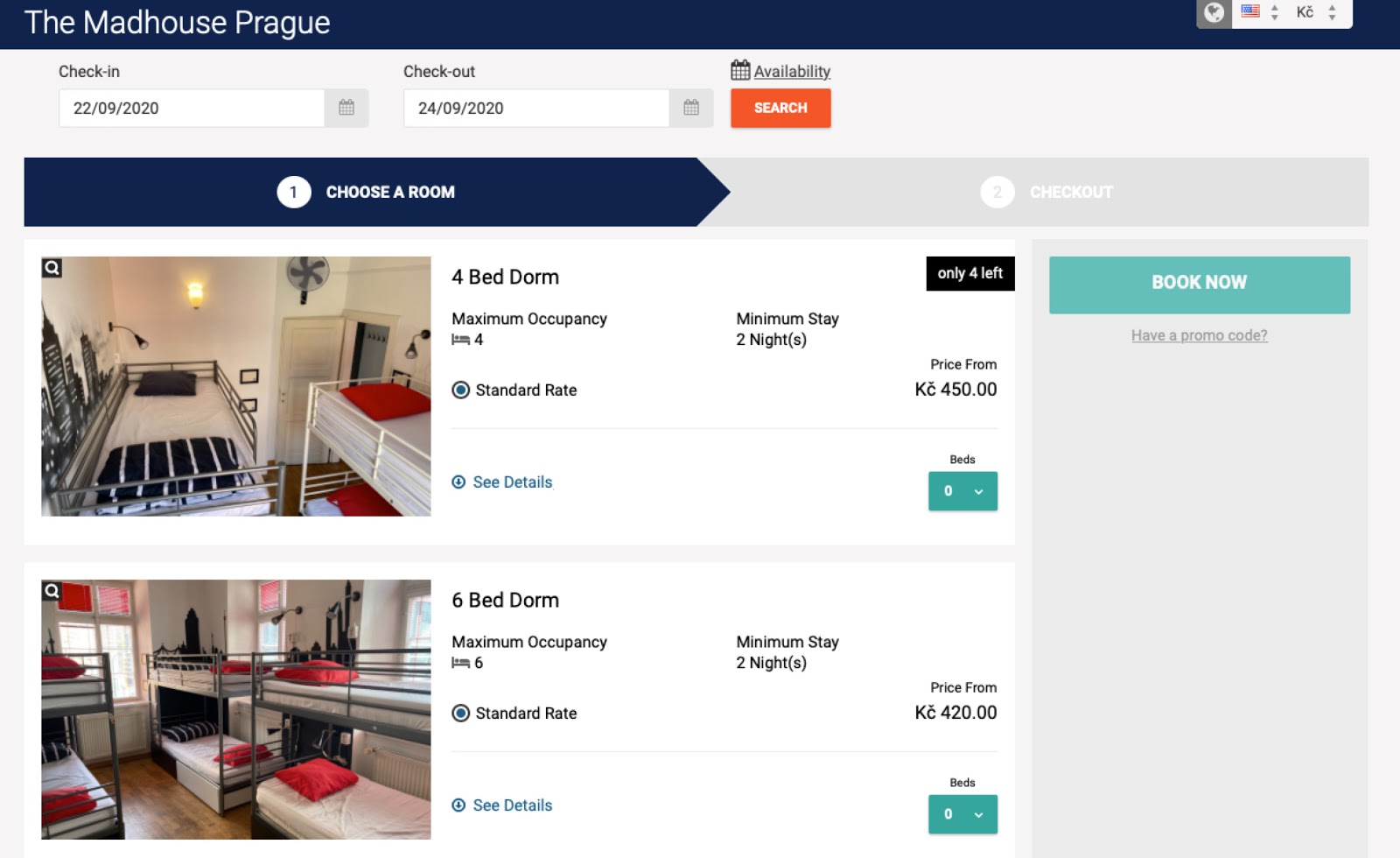
2.3 Children prices
Both engines are capable of offering the option to add children to a room booking at a discounted price. CultBooking and Cloudbeds can have the feature activated on request.
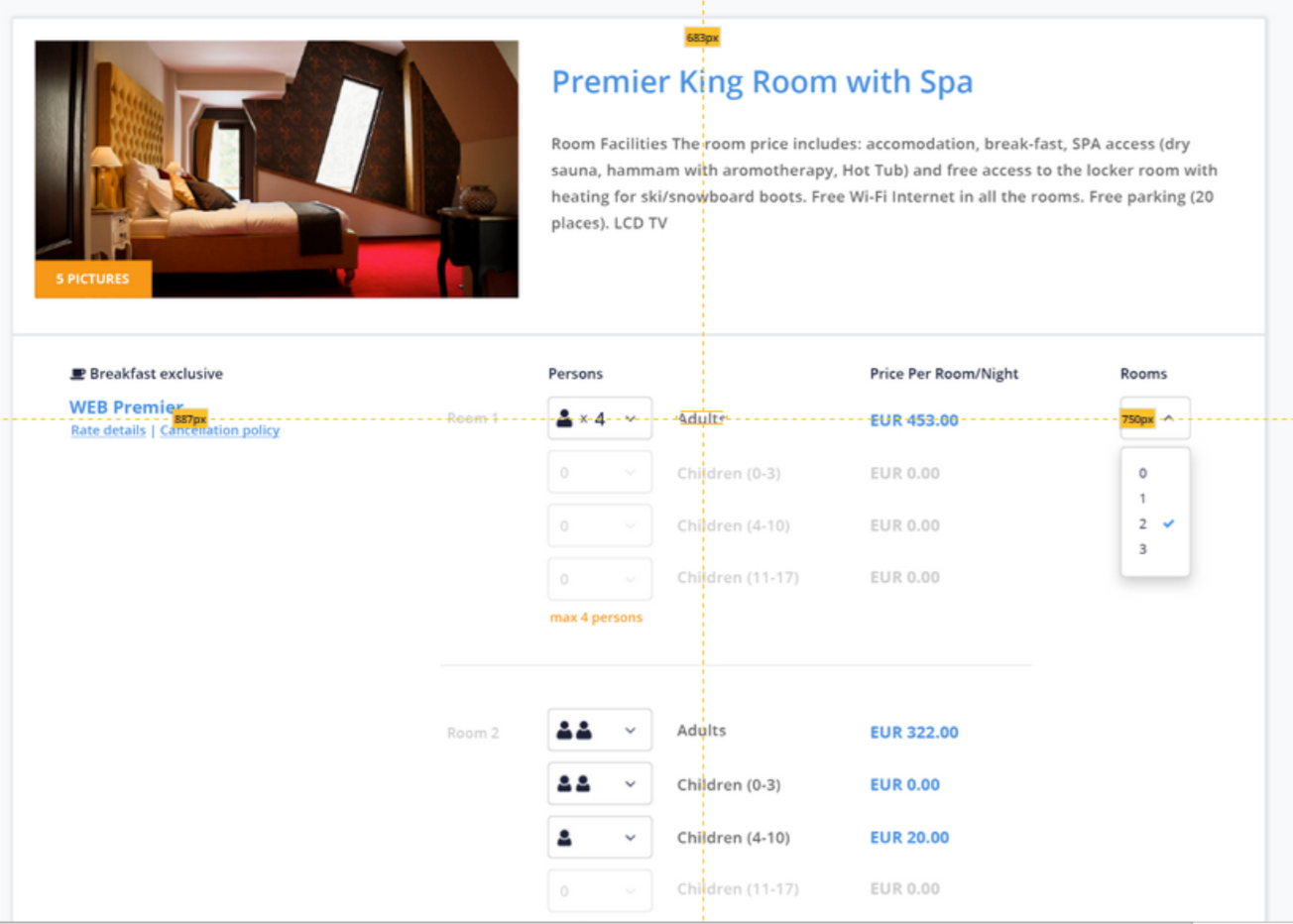
2.4 Booking multiple rooms
Both hotel booking software gives guests the option to book different rooms with one booking.
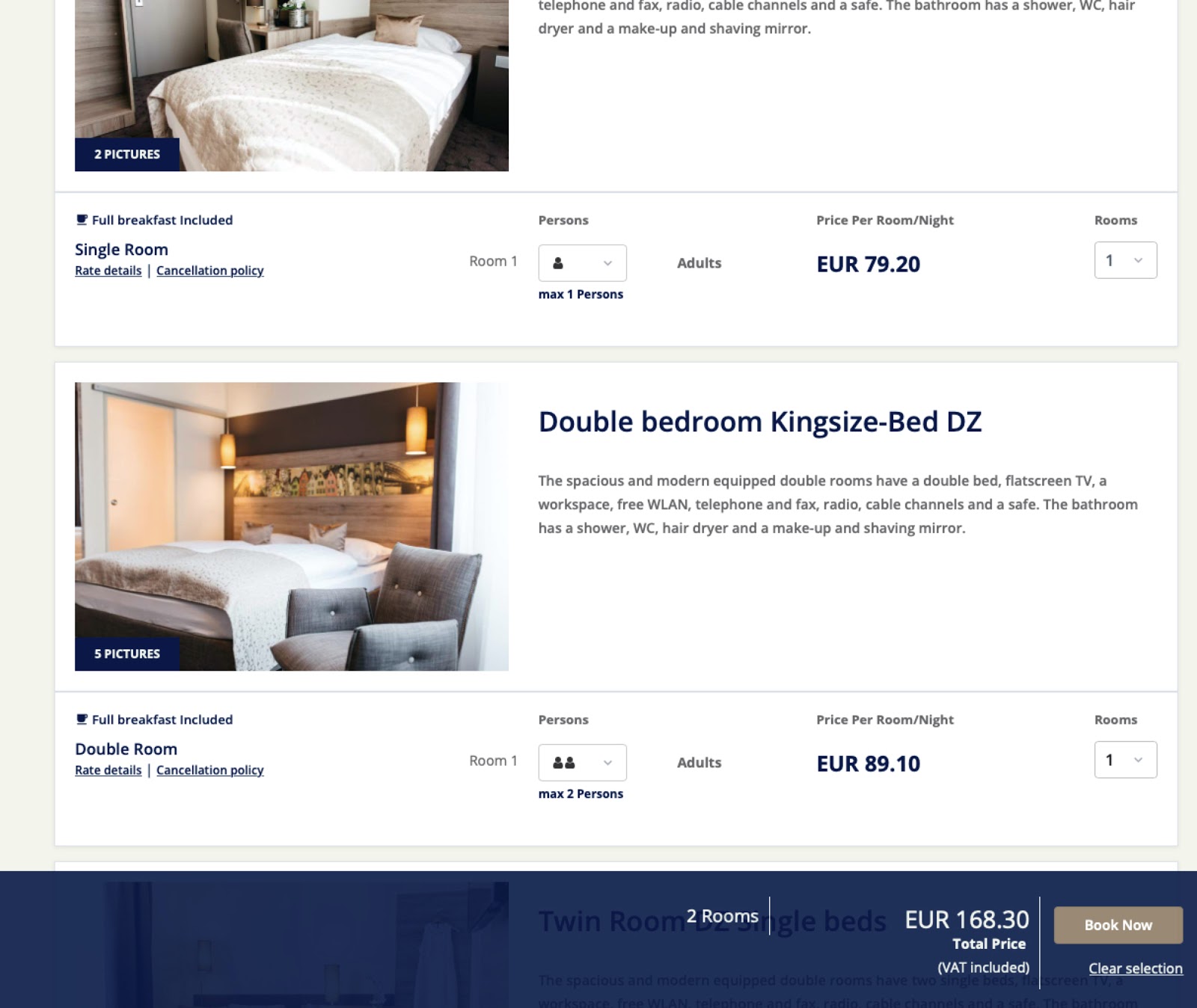
This function of multiple rooms selection and booking in one step, by CloudBeds:
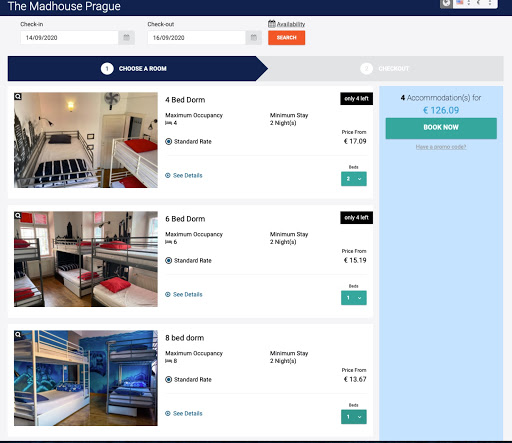
2.5 Payment gateway
Both engines offer two automate methods of secure payment:
- “Pay at the property upon departure,” with the room secured with a credit card payment. So, in case of a no-show or late cancellation, the customer card is debited with a fixed compensation. Usually, the cost of one night.
- “Full payment” for the entire stay is paid directly. The client has various payment choices: Debit Card, Credit Card, PayPal, and much more.
CultBooking reservations software has the following payment gateway from Mollie, click here for more details.
Hotel Sion, a CultBooking user, has not activated a payment gateway, a feature which is available in the reservations system from CultBooking. Hotel Sion has activated a Credit card collection which can charge guests in case of a no show or a cancellation, based on their cancellation policies:
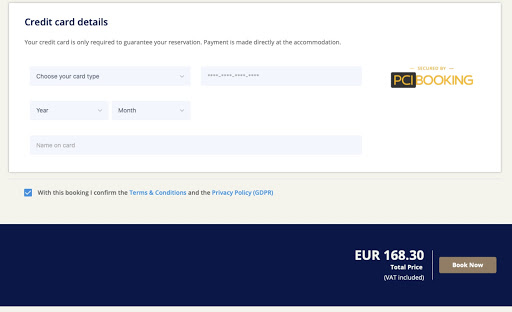
In the screenshot Below are some more details about this function. CultBooking is using PCIBooking, specialized company which offers the maximum level of security:
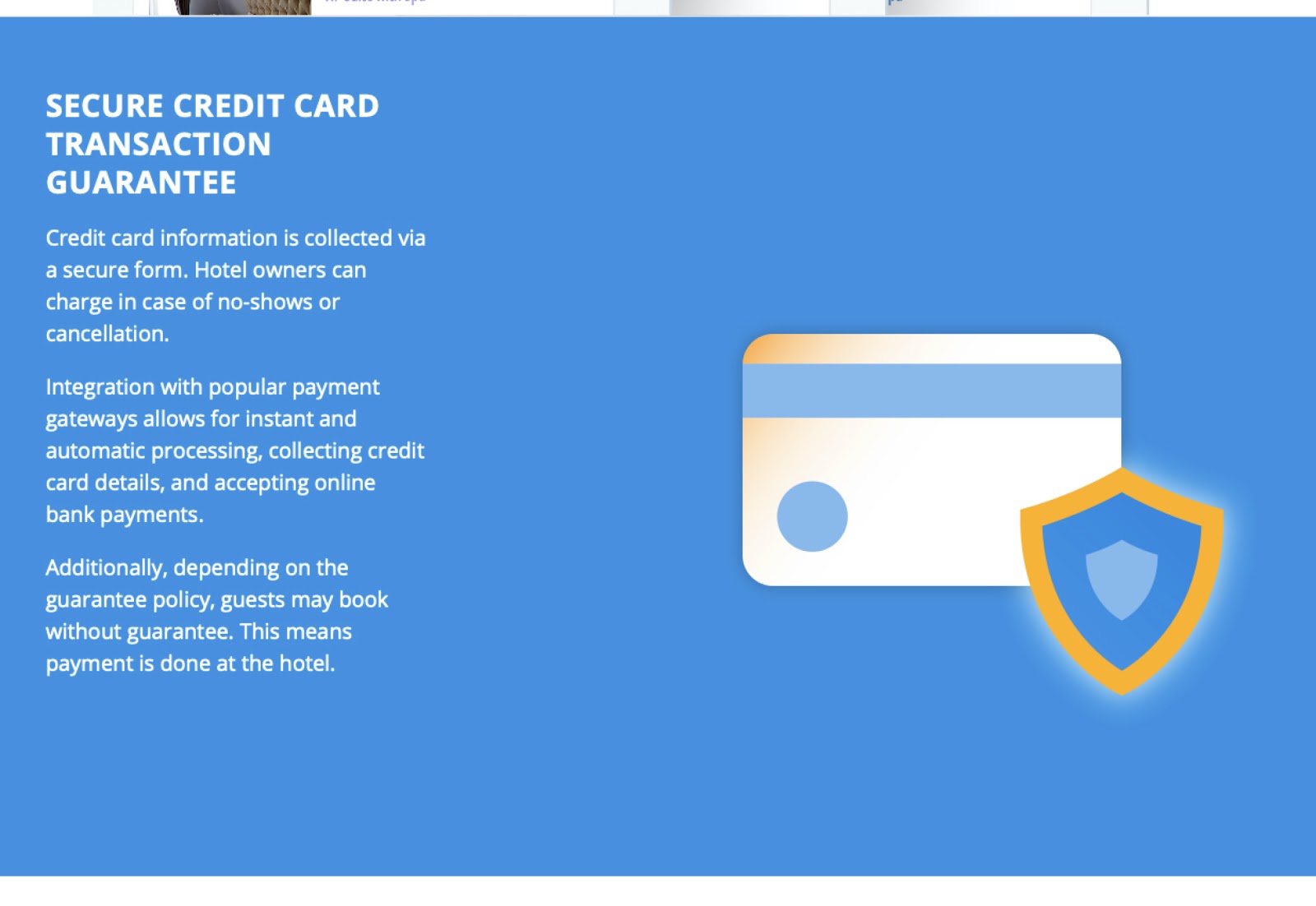
CloudBeds has the option to capture credit card and as well as a payment gateway, that has to be activated on-demand:
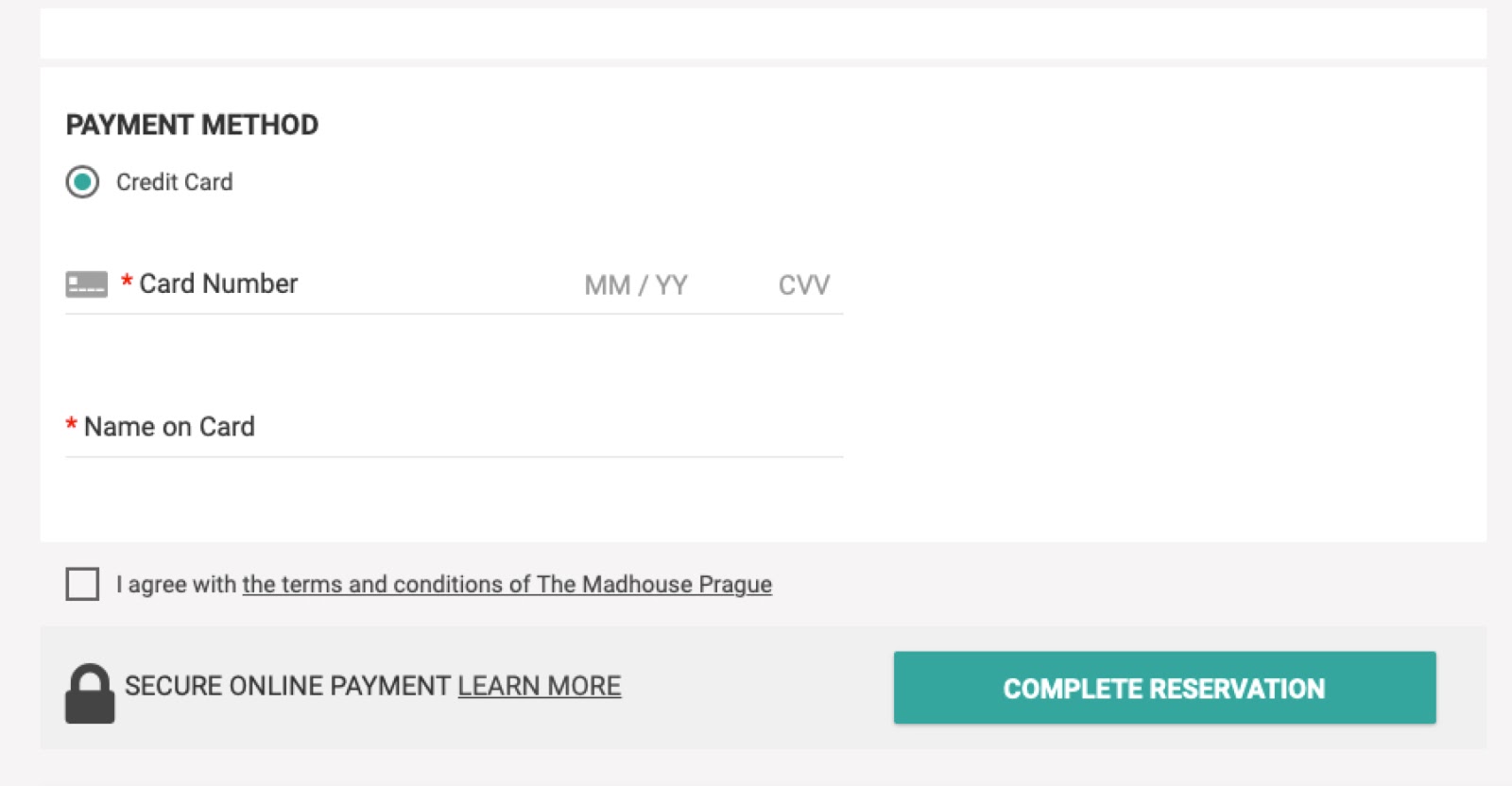
3. Add-ons
3.1 Travel insurance
Neither booking engine offers travel insurance but CultBooking stresses that it can be implemented on demand.
3.2 Extra services
Both engines allow for hotels to have optimized upsell services and add-ons available. In other words, you can advertise directly via the hotel website any extras that are available to the customer instantly online.
Here is a CultBooking upsell page, withing the middle step of the hotel booking process:

CultBooking can make this happen in the middle of the booking process and Cloudbeds as well, except it has to be activated for each hotel as an additional setting.
4. Internationality
4.1 Multi-languages
In the hospitality industry, to reach a worldwide clientele, English and Spanish are the most used languages. Still, many travellers favour using their language as it is more comfortable and handy for them.
Both offer multi-languages so potential guests can switch to their preferred language. CultBooking has 7 languages to choose from while Cloudbeds is way ahead with over 40 languages available.
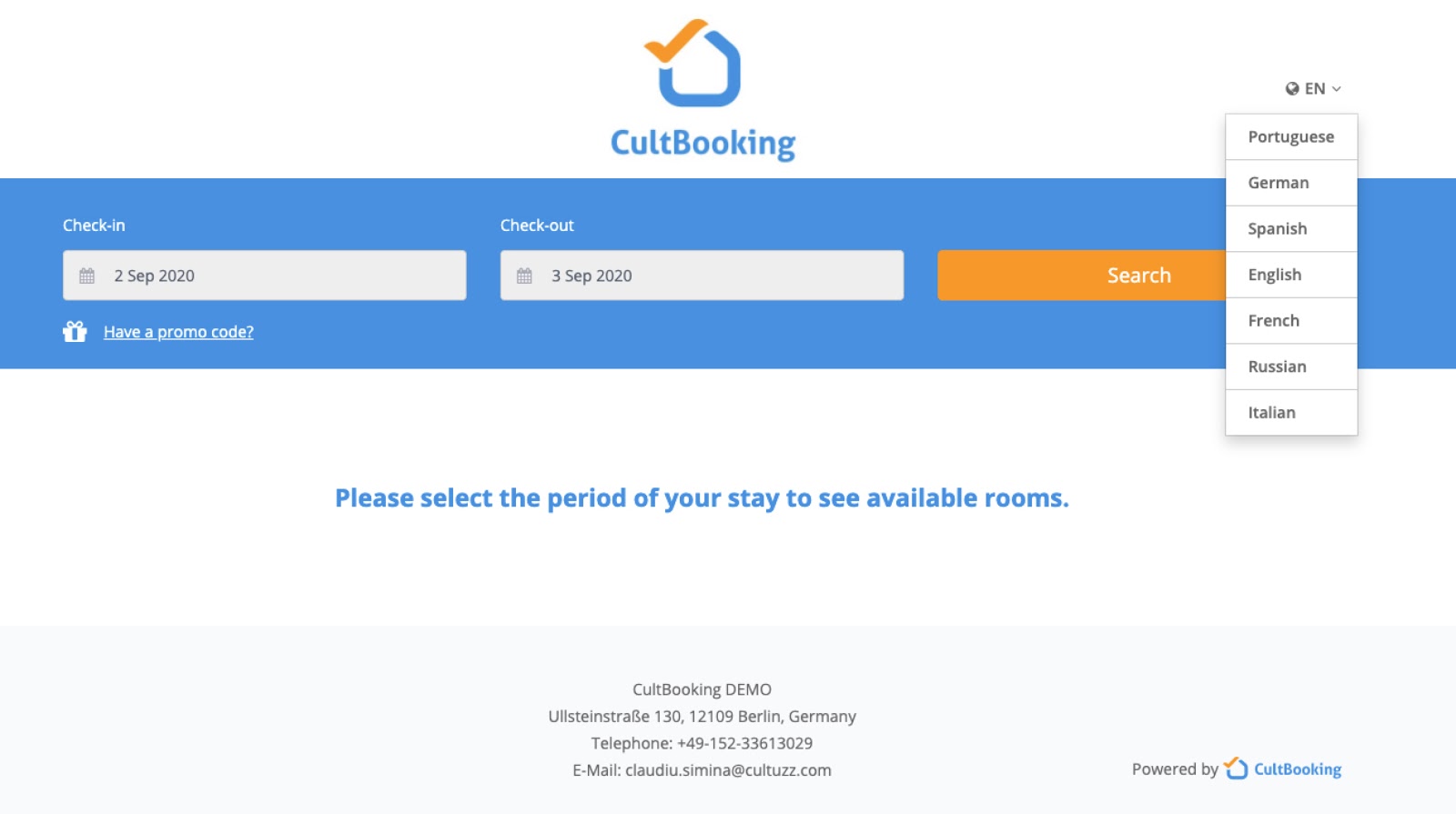
–
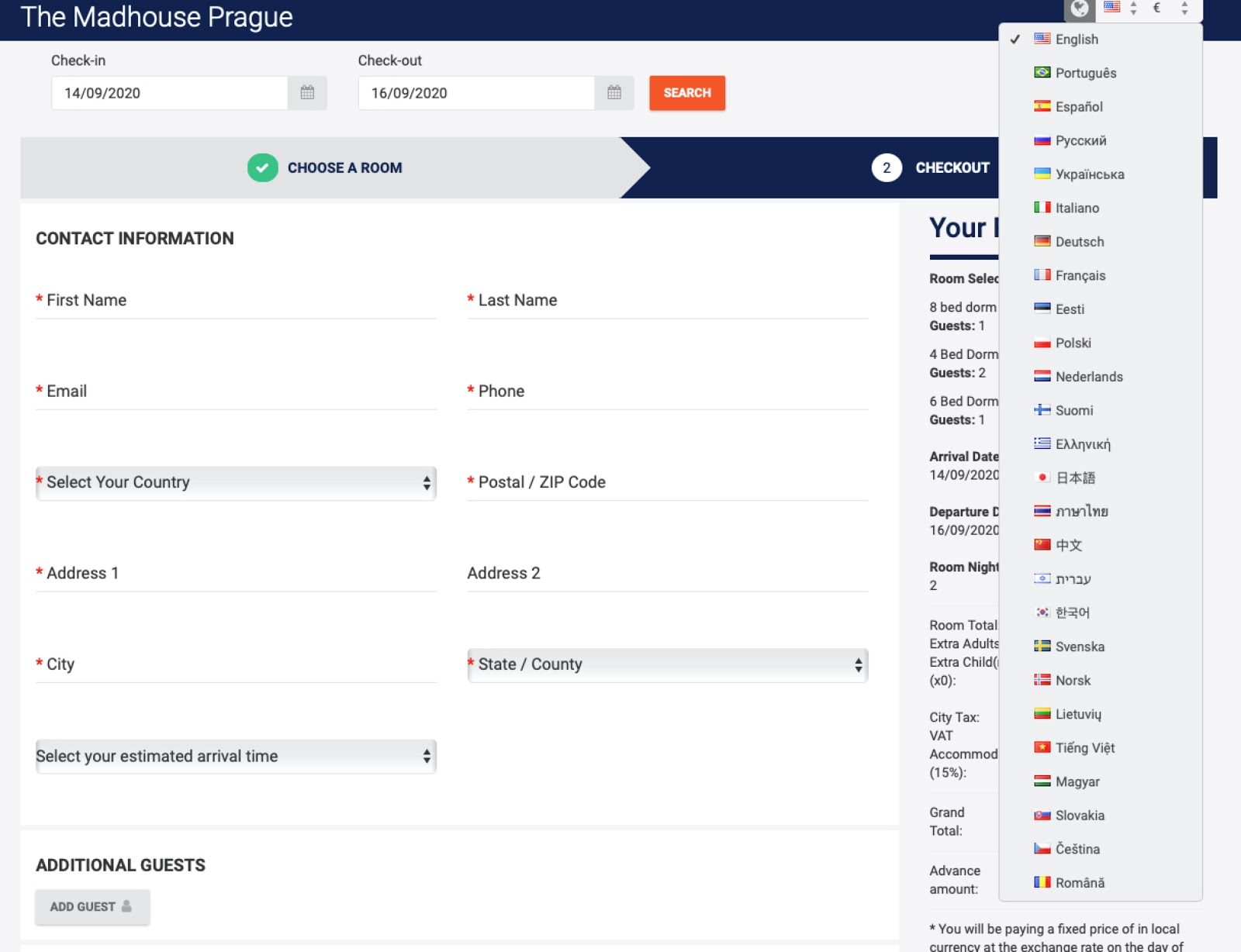
4.2. Multi-currencies
Customers love to be able to compare rates in their currencies, for the simple reason that it’s their reference currency. Similar to the languages, CultBooking lags behind Cloudbeds as their multi-currency option is currently in development.
Cloudbeds has a multi-currency option available presented with a scrollbar. Though the selection of currencies available is impressive, the user interface is tedious and does not offer a search option.

5. Personalization
5.1 Cancellation tag
A cancellation tag is usually a button or a menu option which gives potential guests the option to cancel a booking if they want to, directly from the front end of the booking engine landing page.
CultBooking currently does not have this feature but say that it will be available in the near future based on demand.
Cloudbeds does not have a cancellation tag.
6. Support
6.1 Live chat
CultBooking offers an easily integrated live chat widget which gives potential guests the option to contact the hotel in a simple and efficient manner for both parties.
7. User interface
7.1 Responsive
Both Cloudbeds and CultBooking engines are mobile friendly and highly responsive for various screen sizes. Below screenshots display how the user experience is on iPhone X for example:
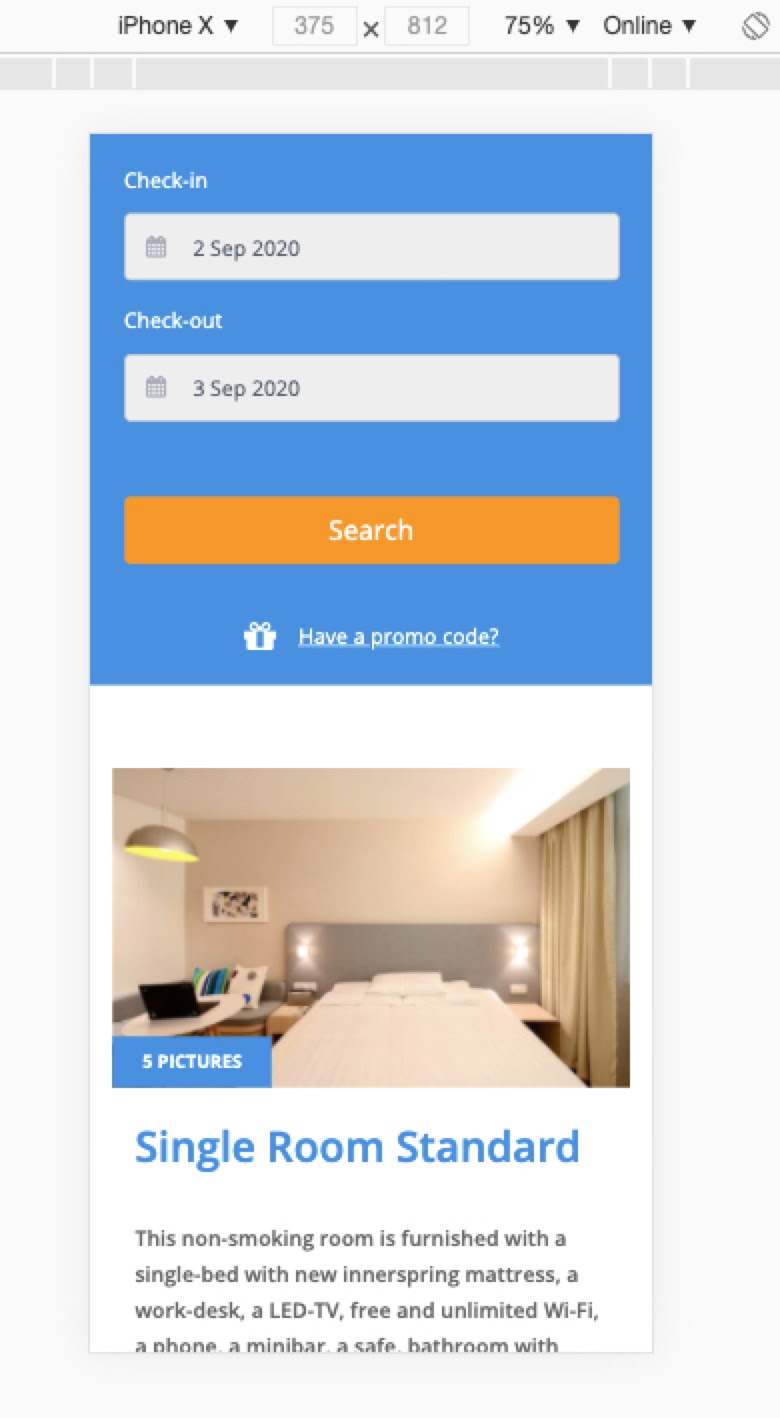
–
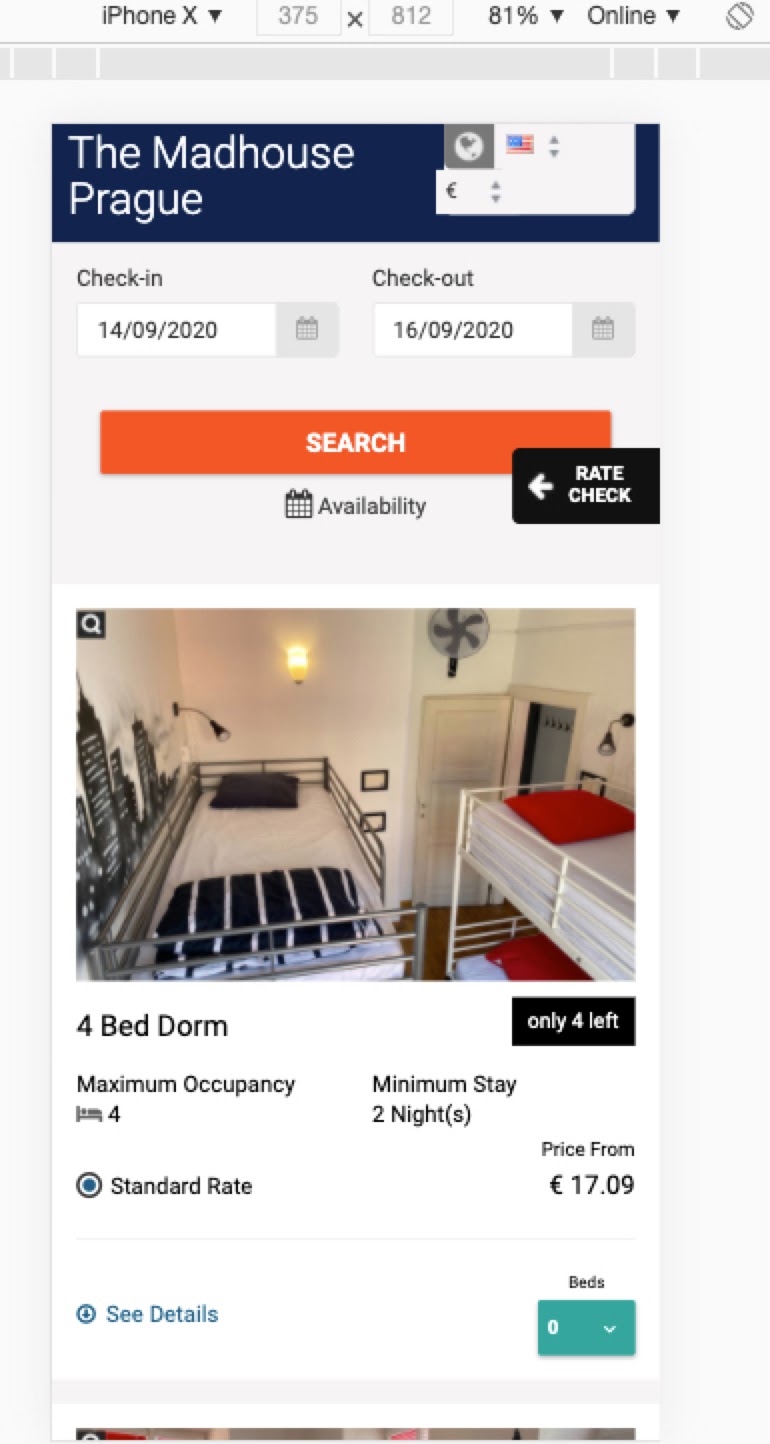
8. Hierarchy
8.1 Multi property
The main advantage Cloudbeds has over CultBooking is Property management software as a part of their Hospitality suite. Multi property feature allows user of Cloudbeds that operates for than one hotel establishment to have many properties under the same system.
CultBooking has had requests for a similar feature and has plans in the near future to implement a solution to it’s hotel booking engine.
8.2 Dedicated individual booking link on each room description page
A dedicated booking link is a feature which gives users the option to generate for example a special link to potential guests that only showcases the availability on double rooms. This can lead to more sales for those already looking for a double room. All the relevant info is on display, delivered to the guest exactly as what he was expecting. This is a specific feature and a good tool to have when working on localization.
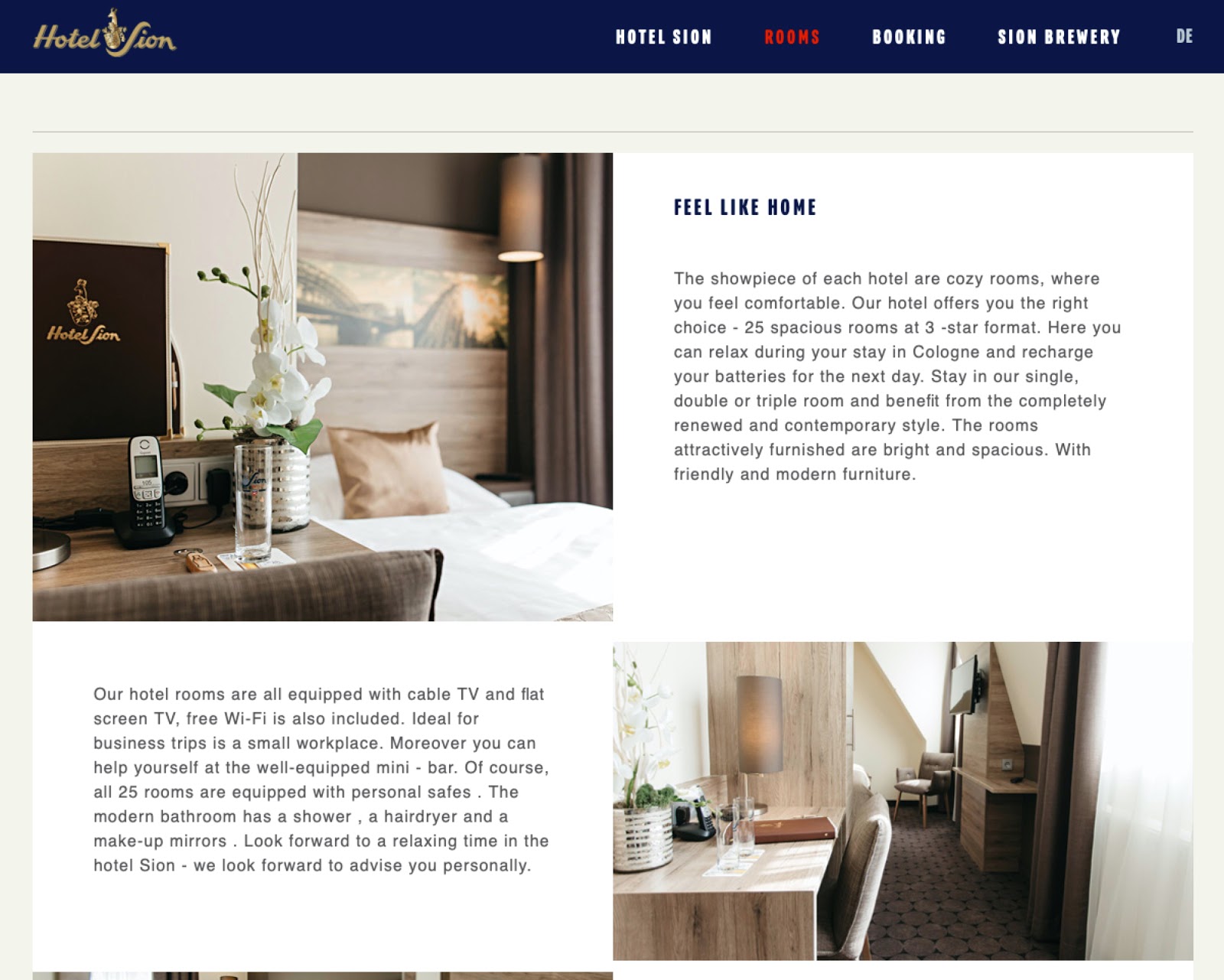
CultBooking offers this specific feature, where a special link is generated to show only the availability of Double room for example. This way, if user seems double rooms and like this one, he does not have to check and see whole rooms displayed. This is specific and localization feature, to deliver to guest exactly what he expects.
Mad House Hostel, of CloudBeds has a page displaying their existing rooms and dorms but has no direct link to each dorm, just the top search bar. This feature is missing:
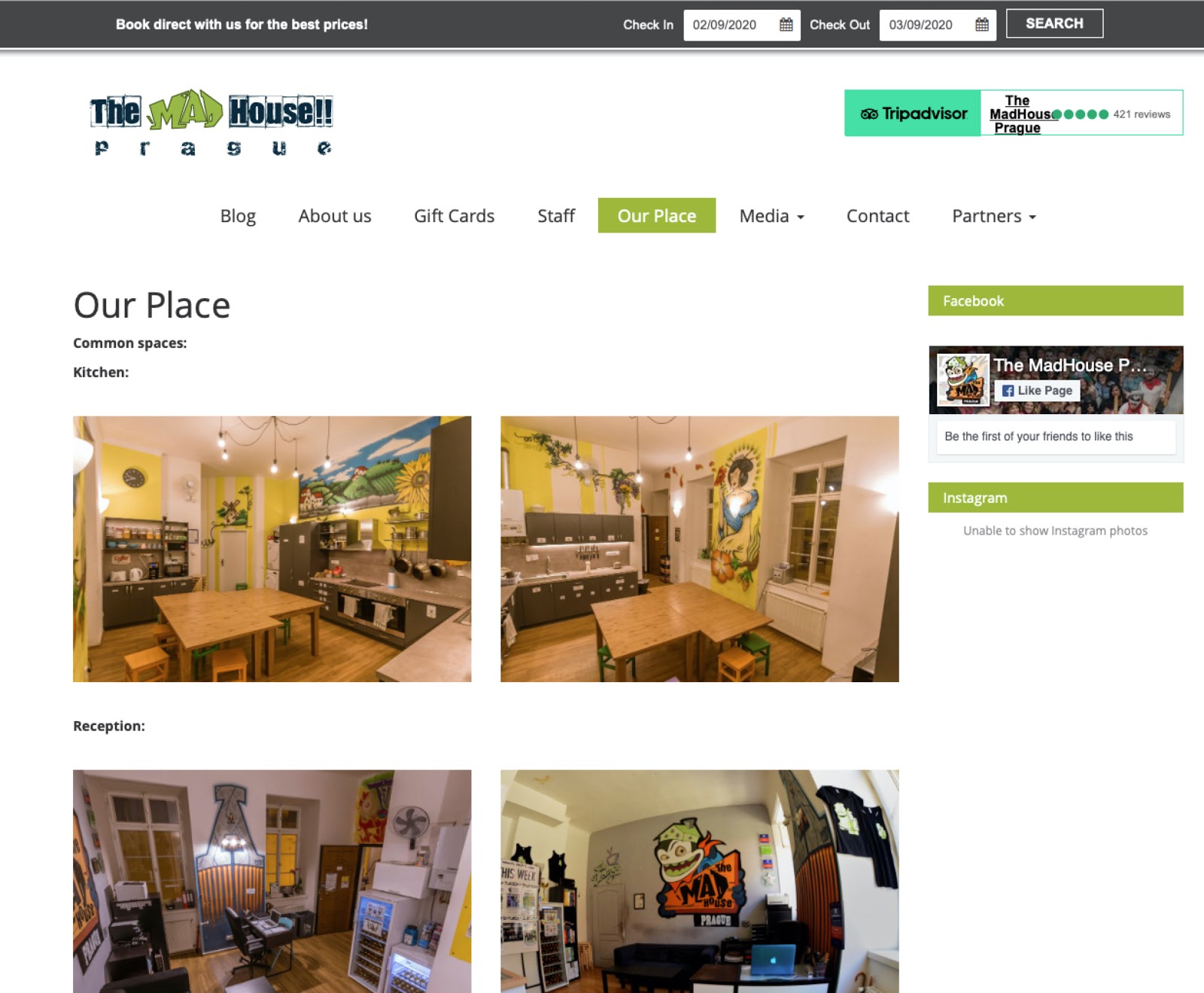
8.3 Product link (Packages or arrangements)
CultBooking offers the possibility to make packages with minimum stay and discount for a weekend or whole week. Or plan for summer or spring some exclusive discounted packages, also called arrangements. CultBooking can do this on-demand.
A popular feature for hotel managers, but it does not seem that Cloudbeds offers a similar feature. There is at least nothing similar listed in the features list on their website.
8.4 Vouchers
Vouchers give hotels the means to build up their own e-commerce within their property. Do you want to sell a bottle of wine, a spa or a nice massage? This is an extra separate service, that guest does not have to book a room to be able to buy a service or even a product.
Cloudbeds tick the boxes and help their clients maximize revenue with all sorts of addons, seasonal promotions and discounts. But this vouchers feature is not visible and not sure if available.
CultBooking is currently developing its own way of integrating vouchers.
9. Integrations
9.1 Property management system (PMS) integration
The CultBooking booking system is integrable in 40 PMS systems. Here is the entire list:
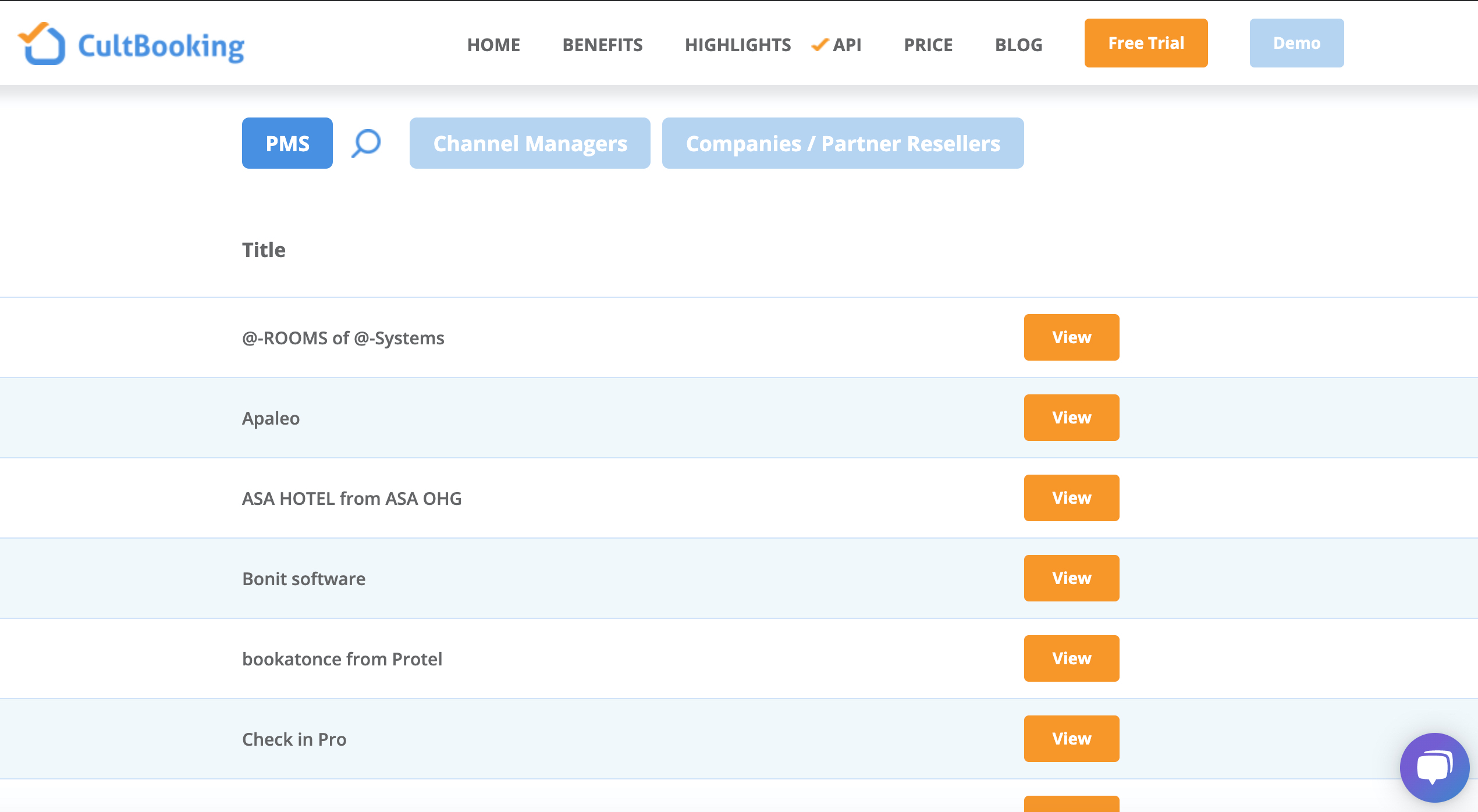
As previously mentioned, Cloudbeds have their own PMS as part of their hospitality suite. As it belongs to a collection of in-house tools developed at Cloudbeds its not connected outside of the Hospitality Suite. A stand-alone software service which does not, at least at the moment connect with 3rd party service partners.
CultBooking connects with over 40 service partners and according to their website is very open to extending the list. Recent additions to Cloudbookings portfolio of partners are Apaleo PMS and Dashy travel.
Cloudbooking have their own certified channel manager, Culswitch and Mappingmaster, apart from their own software solutions, they also connect to 17 other providers and are highly open to new partners, ensuring further flexibility for their users.
—
As a channel manager, Cloudbeds has over 300 channels but has recently acquired MyAllocator channel manager. This acquisition indicates that Cloudbeds future may lie in having a closed channel system, similar to their PMS manager. With a closed system, there are fewer options but might work well for some establishments.
Cloudbeds also has a thriving marketplace for 3rd party apps and developers. CultBooking is currently opening their own marketplace where all partners are welcome.
Conclusion
Having gone through step by step with features, they seem pretty even. If anything at first glance, what Cloudbeds seems to have a standard and quite old design and aesthetics customisation. Many hotels invest heavily in branding and design. For them to be able to easily integrate their colour palette and design into their booking engine is crucial. All businesses care about their image and might think its “money down the drain” if a majority of potential guests never see their precious colours, slogans and well-thought logos. Cloudbeds is also ahead in localization and languages and currency conversion. CultBooking, on the other hand, is not far behind in languages and is currently with their own currency conversion in development.
Cultbooking could draw from the way Cloudbeds help with maintaining clients branding and the marketplace. From there, Cloudbeds clientele can connect 3rd party apps and services to their systems. Especially for clients who are tech-savvy, many of them embrace the idea of implementing third party apps for everything, from PPC to SEO.
But let’s not forget there is an immense difference to the two companies in personnel and infrastructure so it is an interesting conclusion that their booking engine is on par with Cloudbeds.
CultBooking smart calendar feels elastic and smooth, as when, Cloudbeds calendar options feel more like a burden on the system than as an advantage. Both products have strengths when it comes to maximizing revenue from each booking. They are quick to help their clients make sure that everything relevant is on display like addons, promotions and so on.
Though CultBooking seems to make it easier to add for example children’s reservations and discounts to booking.
CultBooking has the win when you browse over their list of channel managers integrated. CultBooking has a modest number of 17 channel integrations when Cloudbeds has only one main channel manager. So for many, this could be a big seller. Especially for those early adapters which have learned to use one channel integration over another through the years, so it’s something to think about.
If we keep comparing within the realms of an even playground, CultBooking has the win in the end. Because, at the end of the day, it’s the same deal that hotel guests expect, they expect value.
For 29 euro a month, a readily available demo and no installation fees the value that CultBooking brings can not be argued with. Yes, CultBooking has closed new partnership is launching white label PMS. Moreover, CultBooking has a connection to over 40 channel managers, so hotel owner has the flexibility to choose from. Is always better to have various experts working for you than just one that does it all. Because if somebody does it all, he can not become a professional or specialist in his field as somebody that specializes just on one field and uses various partners.
Cloudbeds has a lot of advantages, which is true, but the two products have the same strengths with bookings, information and the same security standards that adhere to on-line payments. CultBooking also has 24/7service and live chat available to their clients, the same as Cloudbeds, but for only 29 euro a month.
CultBooking as a service is more streamlined and focused at its core. Their pricing and approachability are praiseworthy.
Cloudbeds have an impressive platform and a diverse selection of tools. Here are their official pricing. You can not buy just booking engine or just channel manager. You need to buy the whole package:
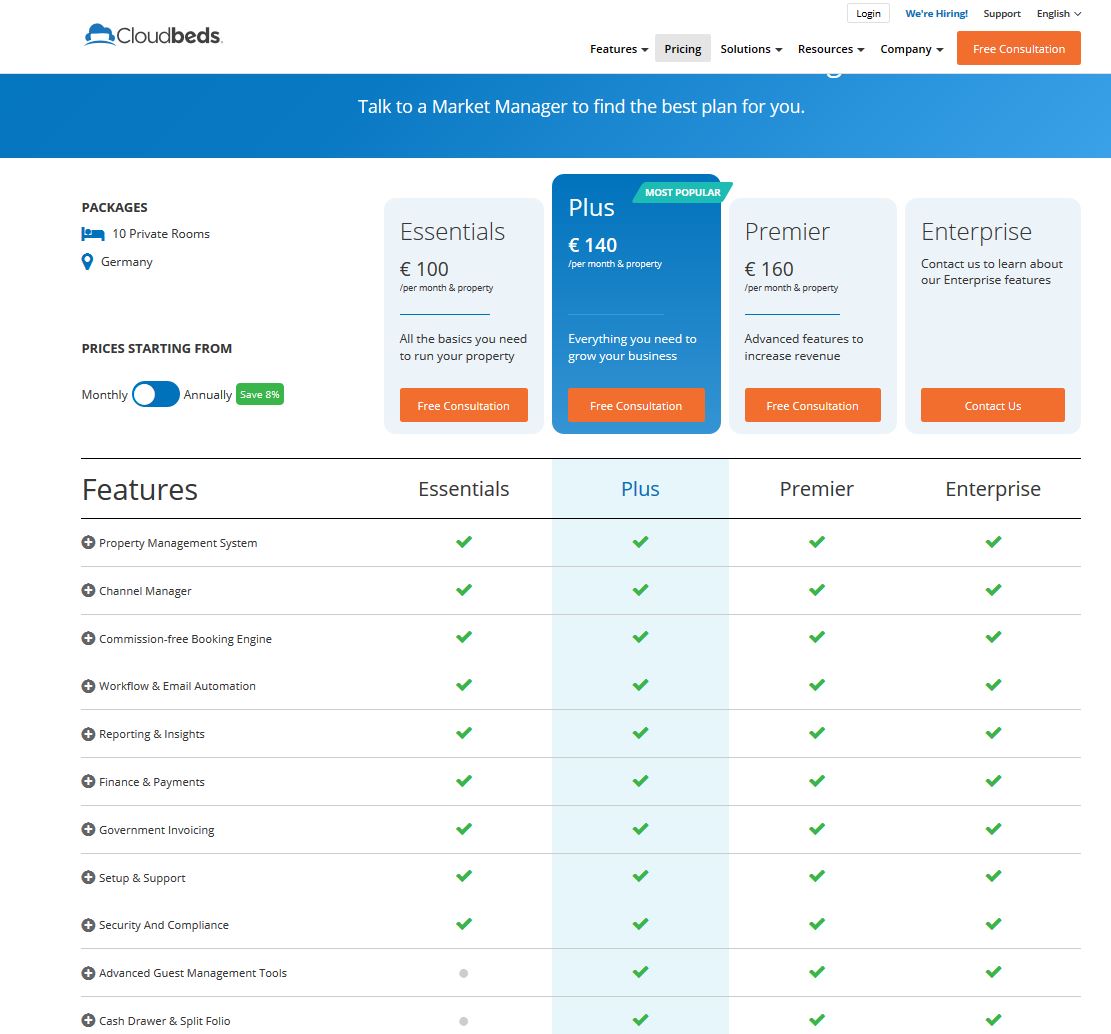
CultBooking gives you flexibility and has recently launched even a starter package, where there is no monthly payment, is like a freemium service:
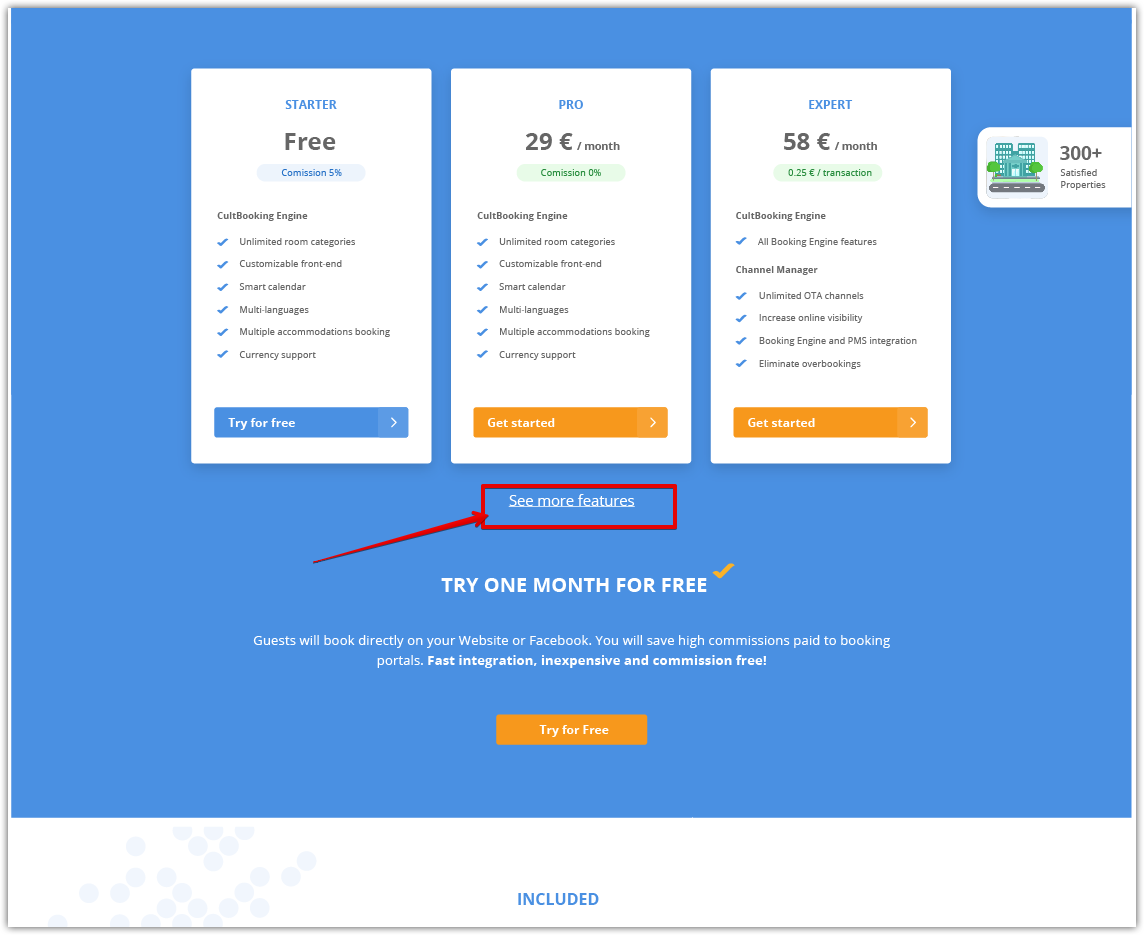
With CultBooking you get best market prices, simplicity and value.
For questions and support, please contact us via chat or email: info@cultbooking.com


 info@cultbooking.com
info@cultbooking.com  0049 30 726225 0
0049 30 726225 0